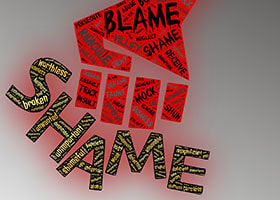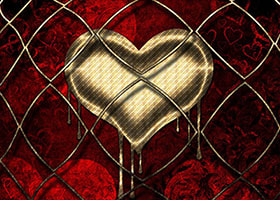|
By Sybil Cummin, MA, LPC (If you are in an unsafe relationship, please take caution in where you keep this article or any of the activities completed based on this article. Please reach out to your local advocacy center if you need help with safety).  Do you find yourself feeling guilty for everything in your relationship? Does everything feel like it is your fault or are you made to believe all your relationship problems are your fault? This tactic is a very common one with in abusive relationships and is one that can keep you hooked into staying for a long time. How can you determine if the fault and responsibility for the problems in your relationship are yours to carry and how can you discard these feelings to gain a true perspective on your relationship? Are you really feeling guilt or is it something different all together? I think that it is important to look at what the term “guilt” truly means and how it can be helpful or harmful to our self-worth and mental health. Guilt can be identified as a feeling when we have done something that goes against our values or when we have done something “wrong.” This feeling, while uncomfortable, can be helpful for us in many ways. It allows us to apologize and correct our actions. We can learn from these experiences in the future. Yes, sometimes guilt is a helpful emotion. Other times, we can carry guilt for things done that are not helpful and is actually harmful. If we have set unrealistic expectations for ourselves or have unrealistic expectations placed on us by our partners that we perceive to be realistic, we can experience a significant amount of anxiety and guilt. An example of this may be if your partner criticizes a small detail of a fork still left in the sink while the rest of the kitchen is spotless. You may feel unhealthy guilt about having a dirty kitchen, when in reality it is only a fork. These unhealthy experiences of guilt can increase our negative self-talk and significantly lower our self-worth. What happens when the feelings of guilt go deeper? For those in an abusive relationship, the feelings you experience may not be guilt at all. These feelings may be feelings of shame. Whereas guilt comes from an event or something that has been done (or alleged has been done), shame is the feeling of being fundamentally flawed, damaged, or worthless . Can one lead to the other? Of course. Unhealthy guilt and shame can go hand in hand. If your partner has shifted from criticizing the things you do to criticizing who you are as a person, they are packing on the shame messages. Many times this shame is also paired with gaslighting tactics (making you question your own reality and making you feel crazy). Then not only are you hearing these messages from your partner, you are telling yourself the same messages; that you have no inherent worth.  Gaining a True Perspective When you feel broken enough and fully believe the shame messages that you have heard and continue to tell yourself through your negative self-talk, it is very scary to leave a relationship. It doesn’t matter how abusive the relationship is, it is scary to leave. Your belief system may be that because you are worthless, no one else will want you or that you are not capable to survive on your own. Your partner may have even said statements similar to these directly to you. So, how can you change this skewed perspective? 1. Write your partner's exact words down to see if they are logical. “I am at work all day and you can’t even clean up the kitchen. You are such a lazy…” If you went to a friend's home and saw a fork in the sink and the rest of the kitchen clean, would you determine that they were lazy? 2. Look at and write down specific situations where you are accepting guilt and shame and try to argue both sides. Would you react the same way if the situation was reversed? In what situations has your partner taken responsibility? If you are taking responsibility for anything he has done or said, then it is not yours to take on. We are only responsible for the things we say and do. “If you didn’t serve me such crap for dinner, I wouldn’t have to…” It doesn’t matter what you served for dinner, he can choose the way he reacts. 3. Share your shame stories. Because abuse in relationships is a very secretive thing and you may have been significantly isolated from your family and friends, this can be a very difficult task. However, sharing your shame stories and messages in some form or another can help you gain a new perspective on your role and your worth. If you have supportive friends or family members, share a message or story that is on the more minor end of your shame message spectrum. Do they see the situation the same way you do? Do they think that you are a lazy piece of crap because there is a fork left in your sink? As you trust the safety of this relationship, you can increase the level of shame you share. If you do not have a supportive person to share with, start to journal your shame stories. It can be scary to write them out on paper; however, when writing or re-reading them, you can gain a new perspective on your responsibility for the situation. 4. Get some distance. This can be very difficult and unsafe in many situations. The more distance you can put between you and an abusive partner, you will start to gain a different perspective. When you hear something negative about yourself over and over you start to believe it. When you can remove some of those messages from others, you can start to look at the messages you tell yourself. 5. Get help from a mental health professional. If you are living in an abusive relationship and guilt and shame are one of the factors that is keeping you stuck, seeing a professional can help be the catalyst for this change. They can also help minimize and plan for any safety issues that may arise. Changing negative beliefs about ourselves is a difficult task. It is much harder if you have had these thoughts since childhood or have been told over and over that you are worthless and that everything is your fault. This will be a part of your healing journey if you want to get out of an abusive relationship. When you realize that you have inherent worth as a human being and that you do not have to carry the guilt and shame for other people’s actions, your life will feel meaningful and you can have hope for the future.
0 Comments
Your comment will be posted after it is approved.
Leave a Reply. |
AuthorSybil Cummin, MA, LPC, ACS Archives
February 2021
Categories
All
|
